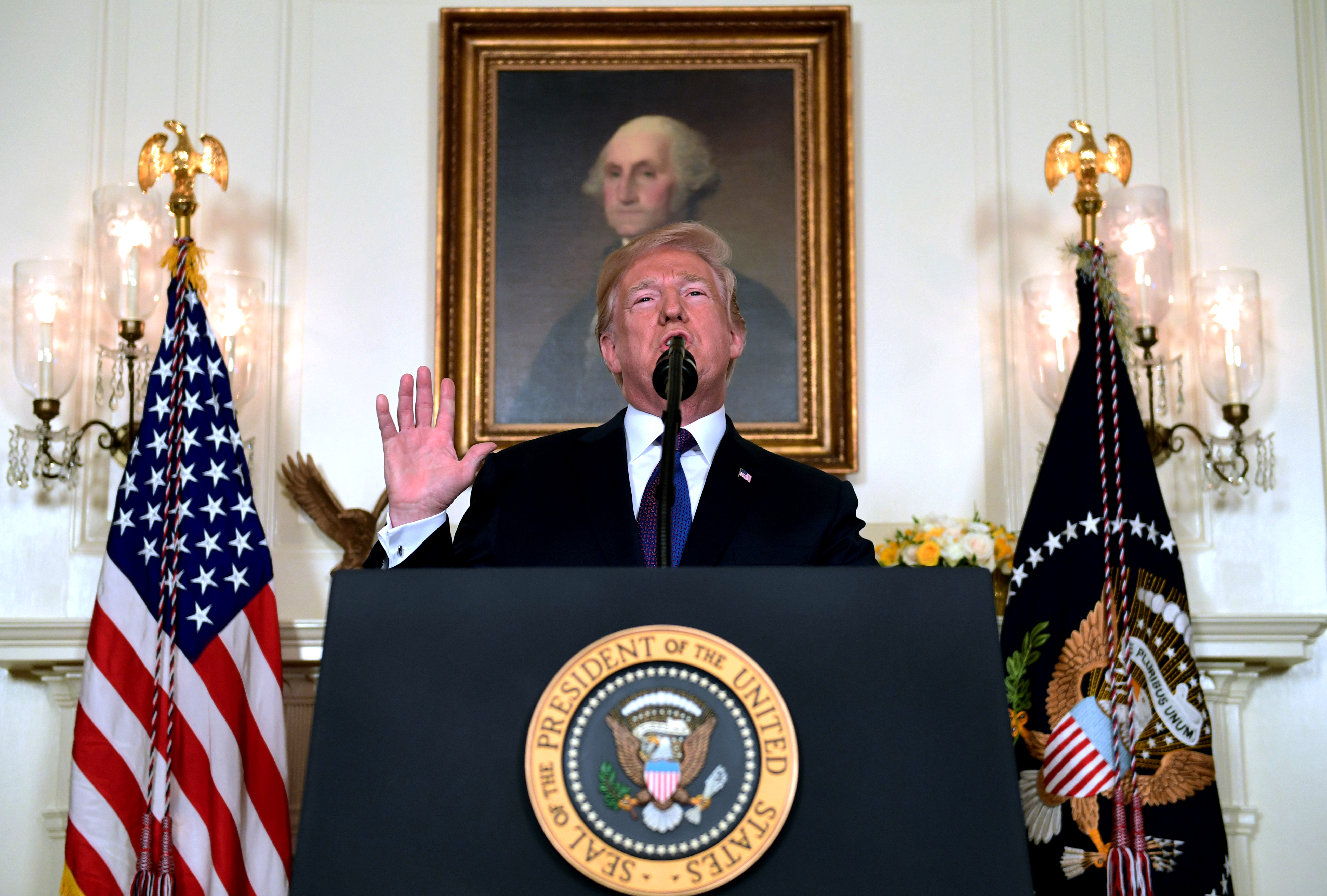Trump's weekend of blowing things up
From airstrikes to tweet storms, it was an explosive time in the White House


In what has become the new normal in American life, President Trump spent the weekend behaving erratically and destructively, as the Mueller investigation closes in on the president's closest associates. The last few days featured almost every square on the Trump Bingo Card — starting with pointless airstrikes whose efficacy was self-evident to the president even before they were over, followed by unexplained reversals of past positions memorialized in tweets ("What I am saying is stay out of Syria," the future president posted in September 2013), early-Sunday-morning Twitter logorrhea including five separate, unhinged statements about Jim Comey before 9 a.m., and head-scratching policy trial balloons like his sudden desire to rejoin the Trans-Pacific Partnership, followed of course by an instantaneous about-face: "Would only join TPP if the deal were substantially better than the deal offered to Pres. Obama."
First, President Trump authorized Friday's joint American-British-French military strike on assets of Syrian dictator Bashar al-Assad, in response to the regime's deplorable chemical weapons attack on civilians in the city of Douma. Trump failed to obtain cover from the U.N. Security Council and declined to seek congressional authorization for such a strike — an assault on a foreign military in the absence of direct provocation or an impending threat. President Obama, when considering a far more wide-ranging attack on Syria in 2013, ultimately concluded that he needed the permission of Congress, which was not forthcoming. Congress has not granted an Authorization for the Use of Military Force (AUMF) against the Syrian government, and the idea that either the 2001 AUMF against al-Qaeda or the 2003 edition for Iraq covers these actions is laughable. While the strike was legally defensible based on past precedent and a strict reading of the 1973 War Powers Resolution, they are a stark reminder of the need to revisit and place boundaries on the president's nearly limitless war-making authority.
Not only that, but the strike was obviously ineffective — the next day, supporters of the Assad dictatorship rejoiced in the streets about the feeble nature of the American response, which was telegraphed so far in advance that the regime and its Russian and Iranian backers could have watched the whole 73-episode run of Game of Thrones between when the attack was threatened and carried out. Everyone in Damascus, Tehran, and Moscow knows this was a one-off attack, of the sort that has almost never achieved anything meaningful. It didn't work for President Reagan when he bombed Libya in 1986. It didn't work for President Clinton when he lobbed cruise missiles into Afghanistan and Sudan in 1998. In fact, military analysts believe these kinds of brief campaigns are counter-productive and ineffectual. The president then, sporting a level of obliviousness that is almost without parallel in American history, sent a celebratory tweet that ended with the words "Mission accomplished!" Whatever the mission was, it very much wasn't accomplished. The shared belief in U.S. foreign policy circles that concrete goals in the Middle East can be achieved with occasional airstrikes unmoored from any underlying plan is one of Washington's deepest and most entrenched delusions.
The Week
Escape your echo chamber. Get the facts behind the news, plus analysis from multiple perspectives.

Sign up for The Week's Free Newsletters
From our morning news briefing to a weekly Good News Newsletter, get the best of The Week delivered directly to your inbox.
From our morning news briefing to a weekly Good News Newsletter, get the best of The Week delivered directly to your inbox.
But the Syria strike had at least one point in its favor: It was a convenient distraction from the grave and rolling constitutional crisis that the president is inflicting on the country. Last Monday, the FBI raided the office, hotel and home of the president's personal attorney, Michael Cohen, purportedly in response to Cohen's involvement in hush payments made to the president's alleged mistresses during the 2016 presidential campaign. The president then launched off on a series of bizarre and dangerous ravings, both on camera and on Twitter. He railed against Deputy Attorney General Rod Rosenstein, calling his conduct "disgraceful" in a loopy, televised meeting with military officials. As reviews of Jim Comey's forthcoming book A Higher Loyalty started to trickle out late in the week, the president took time out of his busy schedule to call the former FBI director a "slime ball" who is part of a pack of "thieves and lowlifes" in the senior leadership of the DOJ and the FBI seeking to undermine his presidency and destroy the country. He attacked his own attorney general, Jeff Sessions, saying that he should have "put a different attorney general in." The crime all of these Republican-appointed men, some of them Trump loyalists, have in common is a refusal to totally capitulate to the president's lawless abuse of power.
The mad king's meltdown was probably for a good cause. Whatever the FBI fished out of Cohen's records seems to be pretty damaging stuff. On Saturday, multiple reports suggested that evidence was found confirming that Cohen made a secret trip to Prague late in the summer of 2016, possibly to meet with Putin loyalists who had orchestrated the hacking of the DNC and John Podesta emails. The Prague caper was a critical feature of the so-called Steele Dossier compiled by former MI-6 spy Christopher Steele during the 2016 presidential election. No one from the Mueller investigation has confirmed whether Cohen met with Russians or anyone else in Prague, but let's have some real talk for a second: Why would the dude lie about going to Prague if he was just there to drink some pilsner and walk around the old city admiring the Charles Bridge? The report is so tantalizing because it might be the first real evidence of direct collusion between Trump associates and Russians seeking to interfere in the election.
The president also seems terrified that Mueller now has access to years of records about the business activities of the Trump Organization. As The New Yorker's Adam Davidson wrote on Saturday, "I am unaware of anybody who has taken a serious look at Trump's business who doesn't believe that there is a high likelihood of rampant criminality." Trump's business fiefdom long operated at the margins of capitalist legality and morality, and survived mostly by getting bailed out repeatedly by increasingly suspicious characters and making investments in places and people no one else would touch. Mueller's writ from Rosenstein included an explicit grant of authority to pursue cases concerning "any matters that arose or may arise directly from the investigation." While Trump may have placed a 'red line' in front of his past business activities, no one at the DOJ is obligated to respect that boundary. And while the president might believe that he could get away with firing Rosenstein, Sessions, and Mueller, doing so would create a presidency-consuming blaze that would make the aftermath of the Comey canning look like a brush fire.
Take a step back for a second from the president's deliberate chaos-making and consider where we are. The president of the United States, an unpopular train wreck who has staffed his administration with a comical assortment of hacks, lunatics, and ideologues, is openly at war with his own political officials and spends his mostly unscheduled days and nights sketching out a lurid and preposterous conspiracy theory about how a group of Republican appointees is bent on using the power of the "deep state" to undermine his courageous crusade to save America. A rolling investigation headed by a widely-admired, Republican civil servant has already led to 19 guilty pleas, including some from people who worked directly on the Trump campaign, with the promise of many more now that the president's personal consigliere has been forced to turn over his life's work to the inquiry. Congressional Republicans lack realistic plans to pass a single piece of meaningful legislation between now and November and are retiring in droves not just to avoid the humiliation of epic defeat but also to escape the smothering misery of working in the service of a gangster who leaves a trail of arrests, indictments, and disgrace everywhere he goes.
A free daily email with the biggest news stories of the day – and the best features from TheWeek.com
This is a presidency not just adrift, but taking on water quickly, listing portside and ready to go down in one of the most spectacular political shipwrecks in American history.
I hope tax reform was worth it.
David Faris is a professor of political science at Roosevelt University and the author of "It's Time to Fight Dirty: How Democrats Can Build a Lasting Majority in American Politics." He's a frequent contributor to Newsweek and Slate, and his work has appeared in The Washington Post, The New Republic and The Nation, among others.
-
 7 bars with comforting cocktails and great hospitality
7 bars with comforting cocktails and great hospitalitythe week recommends Winter is a fine time for going out and drinking up
-
 7 recipes that meet you wherever you are during winter
7 recipes that meet you wherever you are during winterthe week recommends Low-key January and decadent holiday eating are all accounted for
-
 Nine best TV shows of the year
Nine best TV shows of the yearThe Week Recommends From Adolescence to Amandaland
-
 Bari Weiss’ ‘60 Minutes’ scandal is about more than one report
Bari Weiss’ ‘60 Minutes’ scandal is about more than one reportIN THE SPOTLIGHT By blocking an approved segment on a controversial prison holding US deportees in El Salvador, the editor-in-chief of CBS News has become the main story
-
 Has Zohran Mamdani shown the Democrats how to win again?
Has Zohran Mamdani shown the Democrats how to win again?Today’s Big Question New York City mayoral election touted as victory for left-wing populists but moderate centrist wins elsewhere present more complex path for Democratic Party
-
 Millions turn out for anti-Trump ‘No Kings’ rallies
Millions turn out for anti-Trump ‘No Kings’ ralliesSpeed Read An estimated 7 million people participated, 2 million more than at the first ‘No Kings’ protest in June
-
 Ghislaine Maxwell: angling for a Trump pardon
Ghislaine Maxwell: angling for a Trump pardonTalking Point Convicted sex trafficker's testimony could shed new light on president's links to Jeffrey Epstein
-
 The last words and final moments of 40 presidents
The last words and final moments of 40 presidentsThe Explainer Some are eloquent quotes worthy of the holders of the highest office in the nation, and others... aren't
-
 The JFK files: the truth at last?
The JFK files: the truth at last?In The Spotlight More than 64,000 previously classified documents relating the 1963 assassination of John F. Kennedy have been released by the Trump administration
-
 'Seriously, not literally': how should the world take Donald Trump?
'Seriously, not literally': how should the world take Donald Trump?Today's big question White House rhetoric and reality look likely to become increasingly blurred
-
 Will Trump's 'madman' strategy pay off?
Will Trump's 'madman' strategy pay off?Today's Big Question Incoming US president likes to seem unpredictable but, this time round, world leaders could be wise to his playbook
